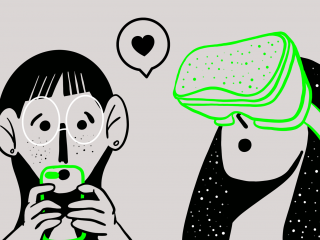Introduction
People make the mistake of referring to young people as Millennials, but realistically speaking, the people they’re referring to as Millennials are now Gen Zers. This is a new beginning for all of us in marketing and for all those who are trying to understand consumers because we’re looking at a generation that is, once again, completely different to the ones that preceded it. Before we can even thinking about marketing to Gen Z, we need to really understand what they’re all about.
Let’s get to it.
Digital Natives
Generation Z grew up after the founding of the Internet of Things, and don’t remember a period of time before it was there. Even things such as dial-up and floppy disks are unfamiliar to them; their reality is all connected, all the time, which means that digital isn’t optional, it’s the norm for them.
- 75% of Gen Z use a smartphone over a computer or a tablet
- 95% of Gen Z use another device while watching TV, most commonly to talk to friends
- 74% of Gen Z choose to spend their free time online.
Uniqueness
Millennials spend their money on experiences; Gen Z spends its money on finding things that makes them unique and allows them to express themselves and speak about their experiences meaningfully.
Statistics:
- Fashionable design is important for 67% of Gen Z shoppers
- 58% of Gen Z will pay more for products and services that highlight their individual personalities
- 66% of Gen Z says that the high quality of a product matters most to them when making a purchase
Consumption as Access
One of the key differences between millennials and Gen Z is their attitude to ownership. Gen Z don’t want the hassle of buying a car just to get themselves from one place to another; it also doesn’t tie in with their environmentally friendly morals. They prefer paying money to access a service such as Netflix and Spotify rather than to have a collection of movies and CDs.
Statistics:
- More than 71% of Gen Z stream videos on their smartphones and other mobile devices
- 76% of Gen Z state that they watch Youtube weekly, compared to 61% of millennials.
- 71% of consumers have a Netflix subscription
Multiple Channels, Multiple Personalities
“To grow up with technology, as my generation has, is to constantly question the self, split into multiplicities, to try and contain our own contradictions.” – Taylor Fang, in her essay for the MIT Technology Review.
The always-on generation has had to deal with social media, or feature on social media, since before they were conscious of what it was. Children of mummy bloggers and life youtubers are growing up already plugged into the digital mainframe, and unlike previous generations where the creation of the internet delineated the course of history, they don’t see technology as something good or bad; they see it as a tool.
Statistics:
- 73% of Gen Z users use Instagram primarily.
- Only 62% of users on Facebook are Gen Z users
- 56% of Gen Z uses social media apps as a form of creative communication
Mental Wellbeing & Habits
Growing up in the shadow of 9/11 and watching a global recession come and go, plus the rise of online-specific tragedies such as school shootings, Instagrammed murders, and the constant and increasing concern of climate change, Gen Z is at the heart of a mental health crisis that seems to have been exacerbated by the prevalence of social media and online communities.
As a result, Gen Z’s greater affinity for tech has also made them more likely to monitor and use the internet as a platform to build awareness of the damaging effects of overusing social media.
Statistics:
- 43% feel pressured to only post content that shows them in a positive light
- 48% of Gen Z say that social media makes them feel anxious, sad, or depressed
- 61% of Gen Z are taking a break from social media
Well-read, well-informed
With Wikipedia and Google at their fingertips, Gen Z has been described as a ‘hypercognitive generation’ who is ‘very comfortable with collecting and cross-referencing many sources of information’. It is not an exaggeration to say that this particular generation is used to being able to find any amount of any information, and to take the time to do so, which poses a unique challenge for marketers whose companies have been involved in scandals or have problematic opinions.
Statistics:
- 65% will try to learn the origins of anything they buy
- 80% refuse to buy goods from companies involved in scandals
- 65% of Gen Z consume information online and prefer knowing what is going on around them
Ethical Consumption
While there is a mounting insistence that brands ‘take a stand’ and back consumer ideals, Gen Z are among the generational mindsets that will actively pull back from brands that don’t support their worldview. While they are not unique in this belief, the sheer amount of Gen Z consumers make this a threat for brands who post ideologies they do not support within their ranks (such as diversity, but without having diversity within the company itself).
Statistics:
- 71% of Gen Z would like to see more diversity in advertising
- 68% of Gen Z expects brands to contribute to society
- 82% of Gen Z students are more likely to buy a product if it’s environmentally friendly
Brands and Gen Z
So where does this leave brands with marketing to Gen Z? Fortunately, Gen Z are forgiving of brands who make mistakes, provided that the brand apologises in a sincere manner and makes up for the mistake.
However, before they become brand ambassadors, they are going to research your brand extensively and will not convert if they don’t like what they like.
Statistics:
- 54% of Gen Z cites social media influence as greater than any other marketing channel
- 60% of Gen Z states that it is important for brands to value their opinions
- 66% of Gen Z will show brand loyalty once they find a brand they like
Core Values
Gen Z’s core-values are not too dissimilar to millennials, and it isn’t a stretch to say that attracting one cohort will help to attract the other.
The core idea to keep in mind is that Gen Z is adamantly, ferociously authentic, and trying to convince them of brand ideals that the brand does not support will alienate this group. If brands are authentic, however, their loyalty is practically a given, and less likely to wander in the event of a crisis.
Their zeal for truth also highlights their core behaviours. Gen Z:
- opts for individual expression over name-brand labels.
- will mobilise themselves for causes they feel strongly about such as climate change, Black Lives Matter, or the Women’s Marches.
- believes in dialogue and communication as key methods to improve society.
- will research and make decisions based on that research and analysis.
What does this mean for brands?
Brands who want to do any sort of marketing to Gen Z need to reconsider their idea of consumption. For Gen Z, consumption has grown to mean more than the physical possession of things’ it’s become an entrenched part of their identity, a way of accessing sources in the easiest way possible, and a way of championing ethics and communicating to businesses which are able to do something about global issues.
In conclusion, Gen Z wants to experiment with the brands that they support and to build their individualities slowly. The sheer amount of information at their disposal, and their habit of googling answers they don’t know or haven’t learned about, makes them difficult to get through to, but once marketers find the balance between authenticity and on-brand messaging, Gen Z is an easier generation to maintain loyalty from.




